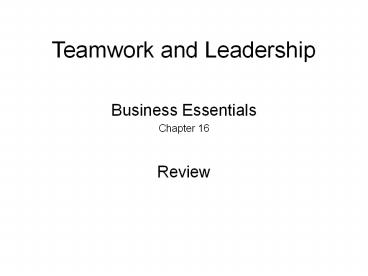Teamwork and Leadership - PowerPoint PPT Presentation
Title:
Teamwork and Leadership
Description:
Teamwork and Leadership Business Essentials Chapter 16 Review True or False Punishing or rewarding people will affect their future behavior. True Punishing or ... – PowerPoint PPT presentation
Number of Views:634
Avg rating:3.0/5.0
Title: Teamwork and Leadership
1
Teamwork and Leadership
- Business Essentials
- Chapter 16
- Review
2
True or False
- Punishing or rewarding people will affect their
future behavior.
3
True
- Punishing or rewarding people will affect their
future behavior.
4
True or False
- Rewarding people who engage in behavior that a
manager wishes to encourage is known as job
enrichment.
5
False
- Rewarding people who engage in behavior that a
manager wishes to encourage is known as job
enrichment. - Positive reinforcement
6
True or False
- Reprimanding or punishing people who engage in
behavior that the manager wishes to discourage
would be a characteristic of a laissez-faire
leader.
7
False
- Reprimanding or punishing people who engage in
behavior that the manager wishes to discourage
would be a characteristic of a laissez-faire
leader. - Autocratic leader
8
True or False
- Power is the ability to influence other people.
9
False
- Power is the ability to influence other people.
10
True or False
- Leadership is the ability to make people act in
certain ways.
11
False
- Leadership is the ability to make people act in
certain ways.
12
True or False
- The universal approach to leadership is the
assumption that there is one way to lead,
regardless of the circumstances.
13
True
- The universal approach to leadership is the
assumption that there is one way to lead,
regardless of the circumstances.
14
True or False
- The autocratic leader allows people within the
group to make all of the decisions.
15
False
- The autocratic leader allows people within the
group to make all of the decisions. - Laissez-faire
16
True or False
- Assuming that the best approach to leadership
depends on the situation is characteristic of the
contingent approach.
17
True
- Assuming that the best approach to leadership
depends on the situation is characteristic of the
contingent approach.
18
True or False
- A democratic leader offers reasoning behind a
decision.
19
True
- A democratic leader offers reasoning behind a
decision.
20
True or False
- An employees knowledge, skills, intelligence,
education, and efforts are known as his/her
outputs to the job.
21
False
- An employees knowledge, skills, intelligence,
education, and efforts are known as his/her
outputs to the job. - inputs
22
True or False
- According to the trait theory, those qualities
most often associated with excellent leaders
include charisma and courage.
23
True
- According to the trait theory, those qualities
most often associated with excellent leaders
include charisma and courage.
24
True or False
- Autocratic leaders are leaders listen to other
people when trying to reach a decision.
25
False
- Autocratic leaders are leaders listen to other
people when trying to reach a decision. - Democratic leaders
26
True or False
- Laissez-faire does not mean hands on.
27
True
- Laissez-faire does not mean hands on.
28
Multiple Choice
- The reinforcement theory is also known as
- Punishment theory
- Operant conditioning
- Reward theory
- None of the above
29
C. Reward Theory
- The reinforcement theory is also known as
30
Multiple Choice
- Characteristics that a leader possesses are
classified as - Behaviors
- Traits
- Classical
- None of the above
31
B. Traits
- Characteristics that a leader possesses are
classified as
32
Multiple Choice
- Leaders who do not listen to other people but
make all of the decisions themselves are known as - Laissez-faire leaders
- Democratic leaders
- Motivational leaders
- None of the above
33
D. None of the above
- Leaders who do not listen to other people but
make all of the decisions themselves are known as
34
Multiple Choice
- The pay, status, and intrinsic rewards that an
employee receives from his or her job are
considered - Inputs
- Outcomes
- Job enrichments
- None of the above
35
B. Outcomes
- The pay, status, and intrinsic rewards that an
employee receives from his or her job are
considered
36
Multiple Choice
- According to the Occupational Outlook Handbook,
most top executives have at least the following
type of degree - Associates Degree
- Bachelors Degree
- Masters Degree
- All of the above.
37
B. Bachelors Degree
- According to the Occupational Outlook Handbook,
most top executives have at least the following
type of degree

